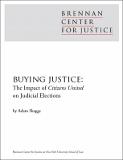|
Reseña:
|
Reseña:This paper examines the damage that runaway spending in judicial elections is having on ourstate judiciaries, and offers several policy recommendations that states should consider in respondingto the threat that outsized campaign spending poses to fair and independent courts. It firstsummarizes recent trends in judicial election spending and documents the impact that escalatingspending is having on public confidence in the courts. Next, the paper highlights seven states inwhich Citizens United’s impact on judicial campaigns is likely to be significant, and explains why thedecision is likely to spur increased special interest spending in judicial elections. The paper concludeswith proposals for responding to our increasingly expensive judicial elections: public financing forjudicial campaigns; enhanced disclosure and disqualification rules; and replacing judicial electionswith merit selection systems in which bipartisan committees nominate the most qualified applicants,governors appoint judges from the nominees, and voters choose whether to retain the judges at theballot box.This paper examines the damage that runaway spending in judicial elections is having on our state judiciaries, and offers several policy recommendations that states should consider in responding to the threat that outsized campaign spending poses to fair and independent courts. It first summarizes recent trends in judicial election spending and documents the impact that escalating spending is having on public confidence in the courts. Next, the paper highlights seven states in which Citizens United’s impact on judicial campaigns is likely to be significant, and explains why the decision is likely to spur increased special interest spending in judicial elections. The paper concludes with proposals for responding to our increasingly expensive judicial elections: public financing for judicial campaigns; enhanced disclosure and disqualification rules; and replacing judicial elections with merit selection systems in which bipartisan committees nominate the most qualified applicants, governors appoint judges from the nominees, and voters choose whether to retain the judges at the ballot box. |

